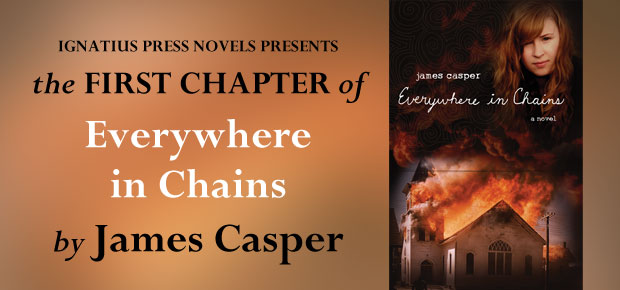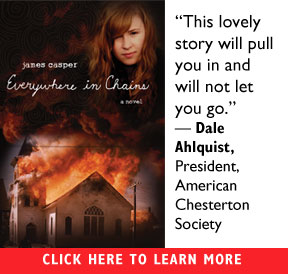
Read the first chapter of the novel Everywhere in Chains by James Casper. If you like what you’re reading, visit the novel’s page to learn more or order!
1
The Mouse in the Wall
Lake Superior is the largest, deepest, and coldest of the five Great Lakes. The other four emptied into its basin would leave room and then some for the ten thousand and more lakes Minnesota claims within its borders. Lake Superior’s water could cover North and South America with a wading pool nine inches deep. Agates of exceptional beauty are strewn along its beaches, with pebbles worn smooth by the action of its waves. Its rock is the oldest on the face of the earth. From most points on its shoreline of over two thousand miles, its opposite shore cannot be seen.
Like any ocean, this vast lake encourages speculation and wonderment. It has its own folklore and mysteries; its ghosts and ghost ships; its own Flying Dutchman; and its pirates, sea shanties, and even a few mermaids. Its depths, darker than the darkest nights, are littered with shipwrecks and human remains preserved in water too cold to support bacterial decay. Here science and superstition agree: This lake truly never gives up its dead. Its drowned mariners have no graves but the lake. Their names can be found inscribed on plaques, like the one destroyed in a Bell Harbor church fire fifteen years ago. St. John Vianney Church was soon rebuilt in a modern design. The plaque bearing names no one alive could remember, from two shipwrecks nearly a century ago, was never replaced.
Not all of Lake Superior’s well-kept secrets lie inscrutably in its cold, dark depths, the stuff of speculation, legend, and sea song. Some are within easier reach on shore in the light of day but equally unknown. One is to be found in the cheery company of Sister Hilaria and her third graders at St. John Vianney School adjacent the new church. Almost a generation of eight-year-olds have stowed their snow boots and hung their coats and scarves beneath the high shelf holding a brown cardboard box among three others of the same color, size, and shape, one to its right and two to its left.
The names of school subjects written on the boxes suggest they contain old textbooks and outdated teaching materials. Three of them do. Sister Hilaria is tall enough to reach them without aid of stool or stepladder, but she has been busy with her students, happy with the textbooks in hand, and till now has never bothered. After eight years at St. John Vianney School, she is being transferred. She intends to do some spring cleaning and straightening up before handing over her classroom to her replacement. She has her eyes on the boxes, layered with the dust of many school years, and a few odds and ends her pupils have tossed up there and forgotten.
Sister Hilaria soon discovers that the box second to the right marked “Geography” contains no textbooks, but instead what appear to be the broken pieces of an elaborate, hand-forged weather vane. Underneath this jumble is a white envelope bearing a blackened scorch mark on one corner as if meant to be burned, or perhaps it had been pulled from a fire by someone who reconsidered, or perhaps it is one of those inexplicable survivors of an inferno. How such things came to be stored in her classroom is beyond imagining.
 The envelope holds a letter torn in two. Sister trembles as she holds its two sides together and attempts to read it. She herself thinks of burning it, for it describes what only two men could know for certain. One, the father of a former student, is in prison. The other is dead. Just two Sundays ago, the second Sunday of Lent, his passing was announced in church. What she holds in hand is too late to change anything. It might not have mattered regardless, but perhaps here is the spark that ignited the match that set fire to the church. The inexplicable at last has been explained.
The envelope holds a letter torn in two. Sister trembles as she holds its two sides together and attempts to read it. She herself thinks of burning it, for it describes what only two men could know for certain. One, the father of a former student, is in prison. The other is dead. Just two Sundays ago, the second Sunday of Lent, his passing was announced in church. What she holds in hand is too late to change anything. It might not have mattered regardless, but perhaps here is the spark that ignited the match that set fire to the church. The inexplicable at last has been explained.
As Sister Hilaria so often says, Not everything we will never know is unknowable. Some things are just never discovered. But some secrets gnaw like the mouse she hears from time to time in a wall of the convent visitor’s parlor. What is it doing in there day by day? Is it trying to find its way out?
Perhaps it knows a time has come to awaken and explore. Migrations will soon begin. A voice seems to urge: Repair the net and the line! Restore the broken connection! Find the lost mitten in the melting snow and bring it home to the other!
Along the north shore of Lake Superior, ice still extends out as far as the eye can see, but not much farther. From her classroom windows Sister Hilaria sees the ice and mist as a thick gray line hugging the horizon over open water beyond the ice. It might be mistaken for a cloud, but the day is bright with sunshine.
She knows what she must do.
Easter is little more than a week away. Inland, snowdrifts are becoming puddles, rain has already pattered on roofs, shirtfronts appear from unzipped jackets, and the Bell Harbor Sentinel’s front page reports a first robin sighting. Beyond the horizon in waters frozen only in the coldest winters, the Great Lakes shipping season has already begun, with taconite boats toiling northeast toward Sault Ste. Marie, meeting freighters on their way to Duluth-Superior Harbor to be loaded with last year’s harvest. Icebreakers have created a pathway. Sunlight has done the rest.
At Lighthouse Consolidated High School, perched on a hillside above the lake, the day ends with yet another surprise, a question out of nowhere and an answer having nowhere from which to come. Words seem to echo and reverberate as words do in hollow places and empty spaces, some words in particular.
“So, where is your real dad?”
“At the sawmill.”
“No, not Marvin, the other one!”
It seems like forever before Penelope can think of much of an answer. Never in her life had she been asked this most natural of questions. The world till now has been keeping her father, the other one, a secret.
The mouse gnaws. Another time is at hand.
“I. . . I don’t remember”, Penelope says, turning away.
Ninth grader Jackie Rae clicks her tongue, gives Penelope a knowing look, then hoists a book bag over her shoulder, almost brushing Penelope’s face with it. Jackie darts away to catch her bus, fortunately not the same bus as Penelope’s.
Penelope’s father, her real father, is never discussed when Penelope is near. He has to be an old story by now, the kind found in a yellowed newspaper stuffed between cracks to keep the chill out. She cannot believe anybody ever talks about him, even when she isn’t in the next room and close enough to hear. Yet if nobody ever talks about him, what made Jackie ask? Who had been talking, and what had Jackie overheard?
One question leads to another and then to another and soon becomes a cascade of springtime melting. Penelope’s father is still alive as far as she knows, but even had he died, nobody would have told her. He is in prison somewhere, but she doesn’t know where. Why is he there? What had he done? Would he ever get out? Did he ever think of her? Once she started thinking about him, where would it lead? It’s true she doesn’t remember him, but she feels as if she does, making it even stranger. Whenever Penelope thinks about her father, she seems to be in two places at the same time, but more aware of one of them. The one of which she is least aware scares her more with its strange, magnetic attraction.






Teresa
August 29, 2019 at 1:43 pm
I received the book by James Casper, Everywhere in Chains, as a promotional free book for placing an order. I want to say how much I am enjoying it. I love a good story, especially with good Catholic bones. I would be interested in reading more of this kind.
Thank you